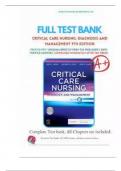Exam (elaborations)
Test Bank for Critical Care Nursing Diagnosis and Management 9th Edition by Linda D. Urden, Kathleen M. Stacy with All Chapters 1-41 |original 100% verified!!!
Institution
Nursing Classes
Test Bank for Critical Care Nursing Diagnosis and Management 9th Edition by Linda D. Urden, Kathleen M. Stacy with All Chapters 1-41 |original 100% verified!!Test Bank for Critical Care Nursing Diagnosis and Management 9th Edition by Linda D. Urden, Kathleen M. Stacy with All Chapters 1-41 |origi...
[Show more]
Preview 4 out of 350 pages
Uploaded on
September 15, 2024
Number of pages
350
Written in
2024/2025
Type
Exam (elaborations)
Contains
Questions & answers
Institution
Nursing classes
Course
Nursing classes
$19.99
100% satisfaction guarantee
Immediately available after payment
Both online and in PDF
No strings attached
, “Chapter “01: “Critical “C “are “Nursing




